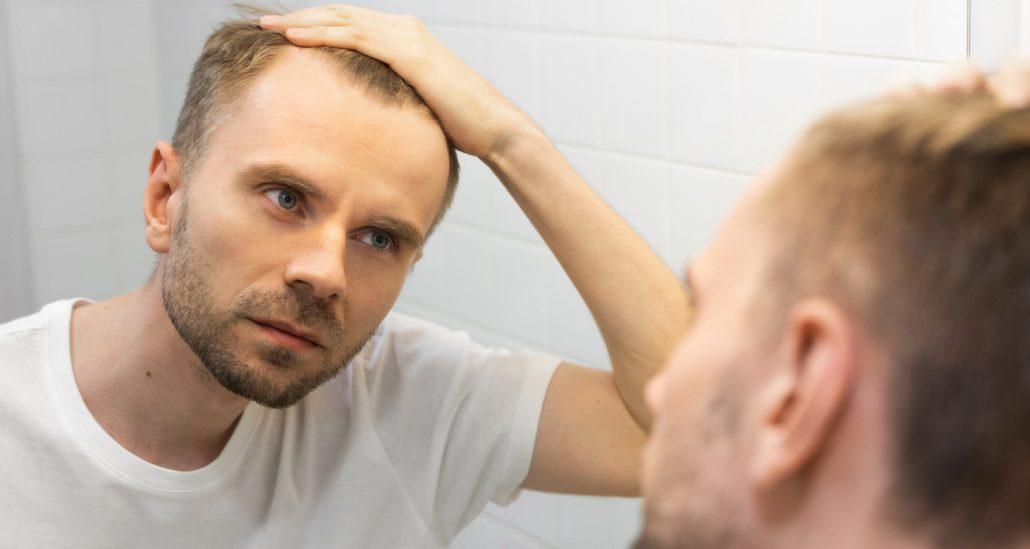- Nicholas DiBella
- Published: July 21, 2025
- Fact-checked by Dr. Desiree Granados

Testosterone Replacement Therapy (TRT) can be life-changing for men with low testosterone. It can improve energy, mood, libido, and overall well-being. But one concern many men have before starting TRT is hair loss. Will TRT make you go bald? Is there anything you can do to prevent potential hair loss?
In this guide, we’ll look at what really causes hair loss while undergoing TRT, how you can prevent it, whether hair loss is reversible, and even the surprising ways TRT can sometimes help hair growth.
Does TRT Cause Hair Loss?
First, let’s clear up a common misconception: TRT itself doesn’t cause hair loss.
The real culprit behind male pattern baldness is the male sex hormone dihydrotestosterone (DHT), a derivative of testosterone. When you undergo TRT, your testosterone levels rise and so can your DHT levels. For men genetically predisposed to male pattern baldness, this can accelerate hair loss.
But not all men on TRT lose hair. Genetics play the biggest role in hair loss. If you’re prone to male pattern baldness, TRT may speed up the process, but it doesn’t cause it out of nowhere.
How to Avoid Hair Loss on TRT
If you’re worried about hair loss while undergoing TRT, here are some proactive steps you can take:
- Use DHT-blocking shampoos: These shampoos contain ingredients like ketoconazole or saw palmetto that may reduce DHT’s effect on hair follicles.
- Consider prescription medications: Finasteride or dutasteride can lower DHT levels systemically. However, these have their own side effects and should be discussed with your doctor.
- Focus on lifestyle: A healthy diet, regular exercise, adequate sleep, and stress management can support overall hair health.
- Work with your doctor: Before starting TRT, tell your provider about your concerns. They can tailor your treatment plan and monitor your symptoms to make any necessary adjustments to your dosage.

Is Hair Loss from TRT Reversible?
If you’ve already noticed hair loss after starting TRT, you might be wondering if it’s reversible. The answer is: sometimes.
Hair follicles that have miniaturized or gone dormant can sometimes be revived, especially if you start hair treatment early. But long-term or advanced hair loss is harder to reverse.
One effective option for treating hair loss is minoxidil, a topical treatment that helps stimulate hair regrowth and maintain existing hair. It works by increasing blood flow to hair follicles and prolonging the growth phase of hair.
If you’re noticing shedding while undergoing TRT, talk to your doctor about your options sooner rather than later. Early intervention is key.
Can TRT Actually Help You Grow More Hair?
Here’s an interesting twist: for some men, TRT actually improves hair growth. Men with low testosterone may experience overall thinning or dull-looking hair. Restoring testosterone to normal levels can sometimes improve scalp hair quality and density. Many people even report thicker beards and body hair.
While TRT can accelerate male pattern hair loss in some men with a genetic predisposition, it can also promote hair growth or improve the look of existing hair.
Conclusion
TRT doesn’t automatically cause hair loss, but it can speed up male pattern baldness in men who are genetically predisposed. The good news? There are ways to prevent, slow, or treat this side effect.
Using DHT-blocking shampoos, prescription medications, and proven therapies like minoxidil can help you maintain your hair while reaping the benefits of TRT.
If you’re considering TRT or noticing hair loss after starting treatment, the Sanctuary Wellness Institute is here to help. Contact us today to discuss your options and create a plan that works for you.
How we reviewed this article:
- Kevin J. Kinter, Razie Amraei, Aabha A. Anekar (2023). Biochemistry, Dihydrotestosterone
https://www.ncbi.nlm.nih.gov/books/NBK557634/ - Sabrina K Henne, Markus M Nöthen PD, Stefanie Heilmann-Heimbach (2023). Male-pattern hair loss: Comprehensive identification of the associated genes as a basis for understanding pathophysiology
https://pmc.ncbi.nlm.nih.gov/articles/PMC10842561/ - Patrick M. Zito, Karlyle G. Bistas; Preeti Patel, Kirin Syed (2024). Finasteride
https://www.ncbi.nlm.nih.gov/books/NBK513329/ - Rami A. Al-Horani, Preeti Patel (2024). Dutasteride
https://www.ncbi.nlm.nih.gov/books/NBK603726
Current Version
July 21, 2025
Written By
Nicholas DiBella
Fact-checked By
Dr. Desiree Granados
Editorial Process
Our Editorial Process

Nicholas DiBella received his psychology degree from West Chester University of Pennsylvania and has been writing content for the Sanctuary Wellness Institute since 2023. He is passionate about all things health & wellness.







